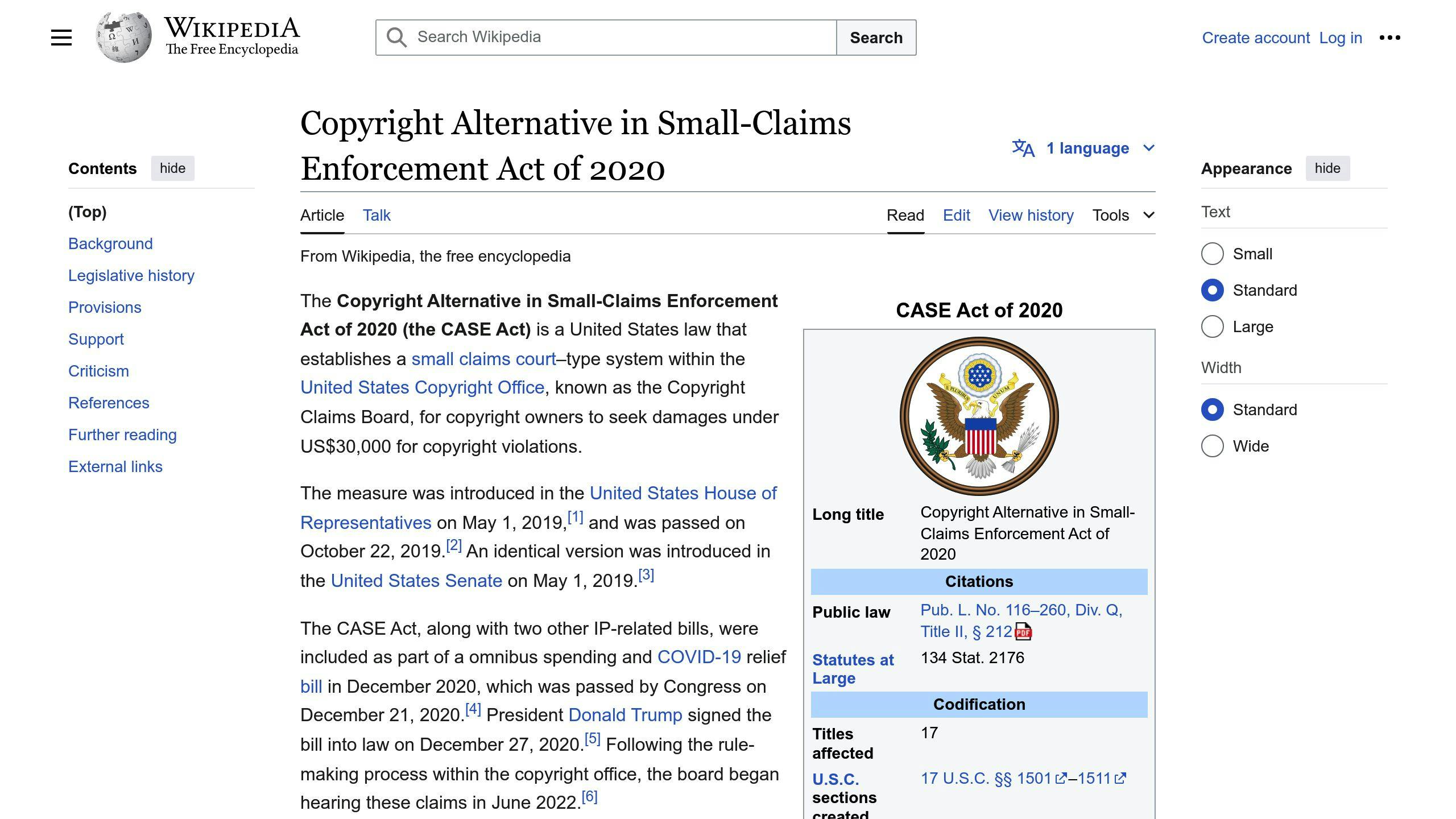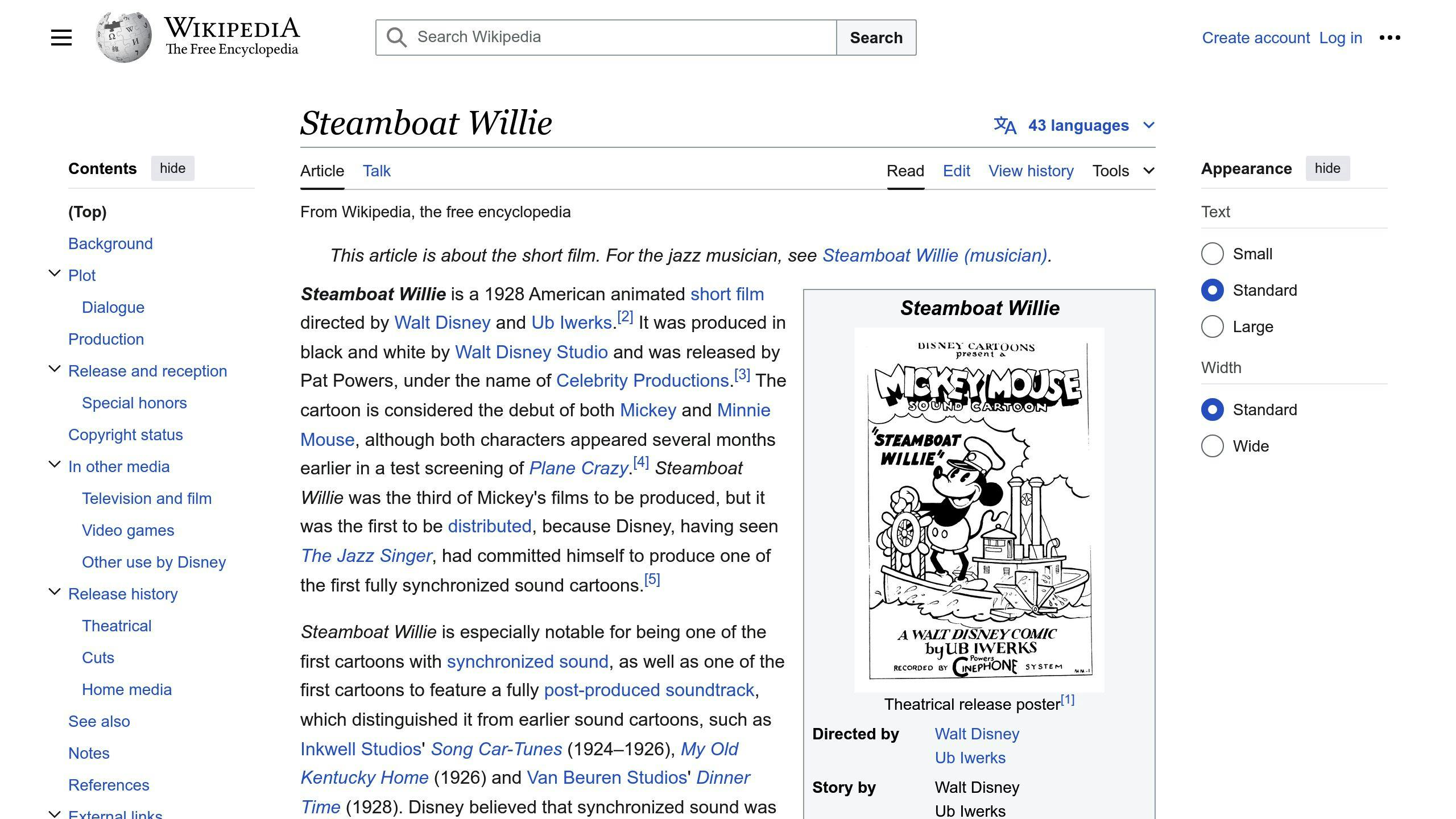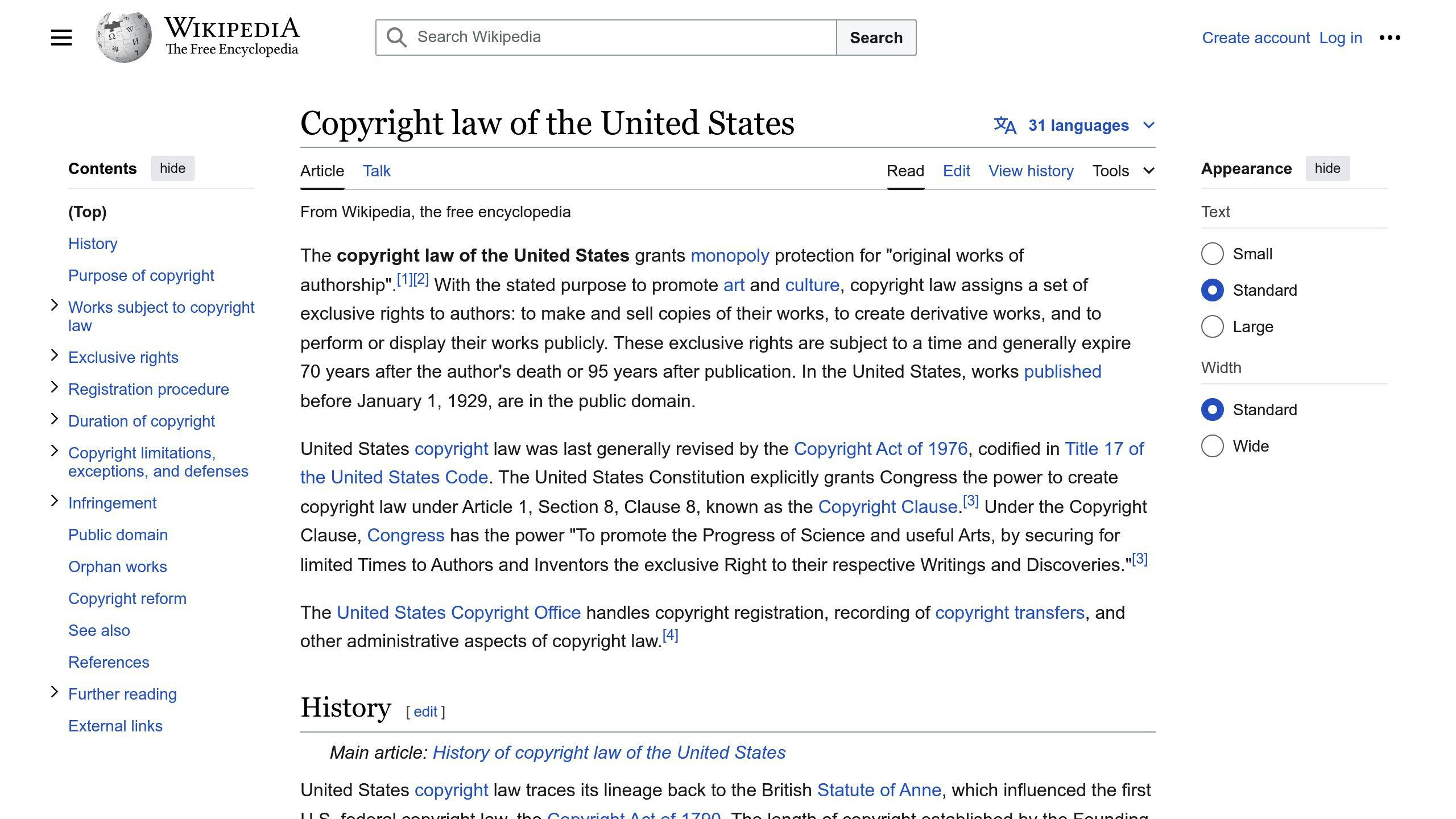Here’s a quick overview of the latest updates to US copyright law:
- AI Art: Copyright possible for AI-assisted art with significant human input
- CASE Act: New Copyright Claims Board for small disputes up to $30,000
- Public Domain Mickey Mouse: 1928 "Steamboat Willie" version now free to use
- Foreign Works Protection: Many previously public domain foreign works regained copyright
- Author Termination Rights: Creators can reclaim rights after 35-56 years
- ARTS Act: Free copyright registration for student competition winners
- Right-to-Repair Laws: Easier to fix electronic devices without breaking copyright
| Change | Key Impact |
|---|---|
| AI Art | Human-AI collaboration copyrightable |
| CASE Act | Cheaper, faster copyright dispute resolution |
| Public Domain Mickey | 1928 version usable, newer versions protected |
| Foreign Works | Some old foreign works re-copyrighted |
| Termination Rights | Authors can regain control after set time |
| ARTS Act | Free registration for young creators |
| Right-to-Repair | More freedom to fix devices |
These changes affect creators, businesses, and consumers. Stay informed to protect your work and use others’ creations legally.
Related video from YouTube
1. AI Art with Human Authorship
Description of the change
The U.S. Copyright Office now allows copyright for AI-assisted art if there’s enough human input. This means people can use AI tools like they use other computer programs, but the human must play a big role in the final work.
Impact on content creators
This change helps artists who use AI in their work. They might be able to copyright their AI-assisted creations if they can show they did a lot of the work. The Copyright Office will look at each case carefully to see how much the person did versus the AI.
| What’s Copyrightable | Human-made Art | AI-only Art |
|---|---|---|
| Can get copyright? | Yes | No |
| Who controls the work? | Human must control | N/A |
| How to apply | Normal way | Special review |
How to stay compliant
To follow these new rules, creators should:
- Keep records of how they made their art
- Tell the Copyright Office they used AI when they apply
- Show how they chose, arranged, or changed what the AI made
- Be ready to explain what parts of the work they did themselves
2. CASE Act Regulations

Description of the change
The CASE Act sets up a new Copyright Claims Board (CCB) in the U.S. Copyright Office. This board helps solve small copyright disputes faster and cheaper than going to court. Claims can be up to $30,000.
Main points of the CASE Act:
- Both sides choose to use it
- Less paperwork and simpler rules
- Board members know copyright law well
- Can handle different types of copyright issues
Impact on content creators
The CASE Act helps content creators in these ways:
| Benefit | Explanation |
|---|---|
| Easier to use | Less complex than regular courts |
| Costs less | Lower fees to file a case |
| Quicker results | Cases finish faster |
| Possible money for unregistered works | Can get damages even without registration |
How to stay compliant
To follow the new CASE Act rules:
- Learn how the CCB works and what it can do
- Decide if you want to use the CCB if someone files against you
- Keep good records of your work and any copying you see
- Think about registering your copyrights for better protection
- Ask a lawyer for help if you’re not sure what to do
3. Public Domain Entry of Steamboat Willie

Description of the change
On January 1, 2024, the copyright for Disney’s 1928 cartoon "Steamboat Willie" ended. This means the first version of Mickey Mouse is now in the public domain. People can use this specific Mickey Mouse without asking Disney for permission.
Key points:
- Only the 1928 Mickey Mouse from "Steamboat Willie" is free to use
- Newer versions of Mickey Mouse are still under copyright
- Disney still owns the Mickey Mouse trademark
Impact on content creators
This change gives content creators new options:
| What creators can do | What to watch out for |
|---|---|
| Use the 1928 Mickey Mouse in new works | Don’t use newer Mickey Mouse versions |
| Make new stories with the old Mickey | Be careful with commercial use |
| Use the character in different ways | Remember Disney’s trademark rights |
How to stay out of trouble
To use the public domain Mickey Mouse safely:
- Only use the 1928 "Steamboat Willie" Mickey Mouse
- Don’t add things from newer Mickey Mouse versions
- Be careful with colors and extras (like gloves)
- Know the difference between copyright and trademark
- Ask a lawyer before using Mickey Mouse for business
4. Supreme Court Decision on Foreign Works
Description of the change
The U.S. Supreme Court backed a 1994 law that gave copyright protection to many foreign works that were once free to use. This decision affects books, movies, and music from other countries.
Key points:
- Brought back copyright for foreign works that were in the public domain
- Covers works by famous creators like Hitchcock and Picasso
- Changed how people can use these works
Impact on content creators
This decision changes things for people who make content:
| Good effects | Problems |
|---|---|
| Better protection for foreign works | Can’t freely use some old works anymore |
| More chances to work with people from other countries | Need to ask permission and maybe pay to use works |
| Encourages people worldwide to create | Might accidentally break copyright rules |
How to follow the rules
To stay on the right side of this law:
- Check if foreign works you want to use have copyright
- Ask for permission to use works that got copyright back
- Know the difference between copyright and trademark
- Think about registering your own works with the U.S. Copyright Office
- Talk to a lawyer if you’re not sure about using foreign works
sbb-itb-738ac1e
5. Termination Rights for Authors
Description of the change
The U.S. Copyright Act now lets authors take back control of their works from publishers and record labels after a set time. Here’s what you need to know:
- For works made after January 1, 1978: Authors can end copyright transfers after 35 years
- For works made before 1978: Authors can end transfers after 56 years
- Authors have a 5-year window to use these rights
- Authors must give notice 2-10 years before they want to end the transfer
Impact on content creators
This change helps content creators in several ways:
| Good things | Things to think about |
|---|---|
| Can get back control of popular works | Legal process is tricky |
| Can make new deals for better pay | Must act within specific time limits |
| Might earn more from successful works | Only works in the U.S. |
How to follow the rules
To use termination rights correctly:
- Keep good records of when you sold your copyrights
- Figure out when you can use these rights (35 or 56 years)
- Tell the publisher 2-10 years before you want to end the deal
- If you made the work with others, most of you must agree
- Talk to a lawyer who knows about copyrights
- Be ready to make new deals
- Remember these rights only work in the U.S.
Authors should see termination rights as a chance to get a better deal for their work as times change.
6. ARTS Act

What the ARTS Act does
The ARTS Act changes the U.S. Copyright Act to help young creators register their work. Here’s what it does:
- Removes fees for copyright registration for some student competition winners
- Applies to middle and high school students
- Teaches students about copyright protection
- Lets students register their work even if they can’t afford it
How it affects young creators
| Good things | Things to think about |
|---|---|
| No cost to register copyright | Only for certain competition winners |
| Learn about copyright early | Must apply quickly |
| Fair chance for all students | Only works in the U.S. |
How to use the ARTS Act
To use this new rule:
- Enter eligible contests (like the Congressional Institute art competition)
- If you win, apply for copyright registration soon
- Apply by December 31st of the year after you win
- Late applications might still get the fee waived, but it’s not guaranteed
- Check the U.S. Copyright Office website for rules and contests that count
This new rule helps young artists protect their work early and learn about copyright from the start of their careers.
7. Right-to-Repair Laws
What’s new
New laws are making it easier for people to fix their own electronic devices. These "right-to-repair" laws say companies must give people the tools and information they need to repair things like phones and computers.
Key changes:
- New York passed a law requiring companies to provide repair tools and info
- The U.S. government is thinking about making similar laws for the whole country
- The Copyright Office now lets people fix some devices without breaking copyright rules
How it affects creators
These new laws change things for people who make content:
| Good | Not so good |
|---|---|
| Can fix work devices more easily | Might clash with some copyright rules |
| More freedom to repair equipment | Game console repairs might still be limited |
| Could save money on repairs | Need to be careful not to break other laws |
How to follow the rules
To stay on the right side of these new laws:
- Keep up with new repair laws in your state
- Learn what you’re allowed to fix under copyright rules
- Don’t change copyrighted software when fixing devices
- Use tools and guides from the device maker when you can
- Ask a lawyer if you’re not sure about fixing something
Conclusion
US copyright law keeps changing to deal with new technology and ways of making things. These changes affect people who create content, run businesses, and use creative works.
Here’s a quick look at what we’ve learned:
| Key Changes | What They Mean |
|---|---|
| AI and copyright | Some AI-made art can be copyrighted if humans do enough work |
| CASE Act | New board for small copyright disputes |
| Public domain Mickey Mouse | The old Mickey from 1928 is free to use |
| Foreign works protection | Some old foreign works got copyright back |
| Author termination rights | Creators can take back rights after a set time |
| ARTS Act | Helps young creators register copyrights for free |
| Right-to-repair laws | Makes it easier to fix electronic devices |
Knowing about these changes is important for:
- Following the rules
- Protecting your work
- Using others’ creations legally
For people who make content and run businesses, understanding these changes helps:
- Find new ways to use copyrighted material
- Avoid breaking the law by accident
- Make smart choices about protecting their work
As more changes happen, it’s good to:
- Keep learning about new copyright rules
- Ask experts when you’re not sure
- Think about how new laws might affect your work
FAQs
What’s new in copyright law?
The Copyright Office has made some changes to make things easier:
| Change | What it means |
|---|---|
| New online system | You can now submit copyright documents online |
| Started in summer 2022 | The system is fairly new |
| Covers ownership transfers | You can record when you sell or give away your copyright |
| Faster and easier | It takes less time to do copyright paperwork |
What is the new copyright legislation?
A new bill wants to change how long copyrights last:
| Current Law | Proposed Change |
|---|---|
| Life of author + 70 years | 28 years, with option to renew for 28 more |
| Applies to works after 1977 | Would apply to all new works |
| Long protection time | Shorter protection time |
This new bill tries to:
- Give creators time to make money from their work
- Let the public use older works sooner
The bill is not law yet. It’s just an idea some people want to discuss.

